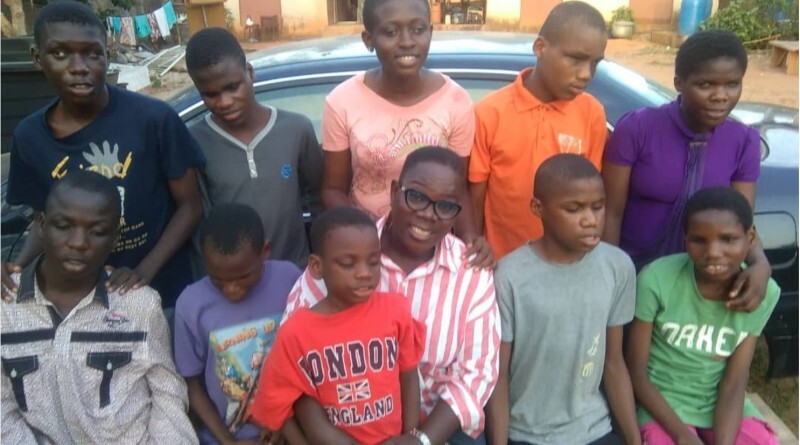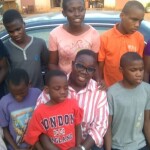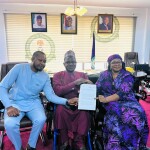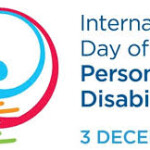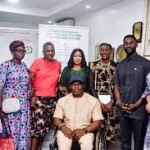A mother. Thirteen children who hardly know they were born. All struggle in a world they hear owes them nothing.
By Segun Elijah
Table of contents [Show]
- She spent 11 years engulfed in darkness, inside their one-room apartment her mother closeted her. The day she sank to the darkest reaches of the tunnel, she announced two options.
- Her family chose neither.
- Glory’s eyes, clear like that Yuletide evening’s sky, speak of stillness, and her voice carries a dollop of hope as she talks. Pamilerin and Michael sit close by, in the tabernacle a clump of banana trees makes them. The hallowed grove nestles close to the fence of their home—all theirs till December ending. Christian, Paul, Damilare, and Ibukun have just left, after prayer. Others are pottering about inside the house five meters away. They’re either preparing dinner, or doing whatever they want. They don’t feel like any interview now. Or anything coming from some authority figure whose order they can parry.
- The children have a number of things that make them. But Glory projects more passion into what she sees with her third eye.
- She placed hope foremost on her mind the day Auntie Juliet brought her to the WACWDI on Sanni Street, Meiran, Lagos.
- “Ma, can I ever amount to anything again in life?”
- She couldn’t see how.
- Funmi Olagunju, in about a decade, has taken in more than 70 kids with different degree of concern for the futures they can’t see. Over four more decades of life’s hard knocks helped her fish out the right words to speak when the 17-year-old that life happened to at nine—in JSS 1—came for divination. And it happened when Lagos had no way of helping secondary schoolchildren who got blind at birth—or those who lost their sight, totally or partially.
- Shame also compounded her despair. All her friends except two took off. Her siblings stopped leading her around and across the road in front of their house, to church or doctor’s appointments. “They told me their friends would see them,” she says. Some church members also readily pointed out ‘that girl’s’ family.
- Her mother, too, refused to get a grip. She was demonstrating faith—like the pastors and prayer houses where she took Glory asked her to do.
- “She would tell me and others nothing was wrong with me. ‘Nobody should call my daughter bad names!’ They locked me inside, and went their ways to hustle every day.” Her only companion, a transistor radio her father tuned to Brilla FM, murmured forever in a corner.
- After eight years, she finalized a strategy to liberate her soul trapped in the room. For her tragedy—Glory chose a day, and a place.
Her family chose neither.
The children have a number of things that make them. But Glory projects more passion into what she sees with her third eye.
She placed hope foremost on her mind the day Auntie Juliet brought her to the WACWDI on Sanni Street, Meiran, Lagos.
“Ma, can I ever amount to anything again in life?”
She couldn’t see how.
Funmi Olagunju, in about a decade, has taken in more than 70 kids with different degree of concern for the futures they can’t see. Over four more decades of life’s hard knocks helped her fish out the right words to speak when the 17-year-old that life happened to at nine—in JSS 1—came for divination. And it happened when Lagos had no way of helping secondary schoolchildren who got blind at birth—or those who lost their sight, totally or partially.
Shame also compounded her despair. All her friends except two took off. Her siblings stopped leading her around and across the road in front of their house, to church or doctor’s appointments. “They told me their friends would see them,” she says. Some church members also readily pointed out ‘that girl’s’ family.
“She would tell me and others nothing was wrong with me. ‘Nobody should call my daughter bad names!’ They locked me inside, and went their ways to hustle every day.” Her only companion, a transistor radio her father tuned to Brilla FM, murmured forever in a corner.
After eight years, she finalized a strategy to liberate her soul trapped in the room. For her tragedy—Glory chose a day, and a place.
Michael was flung out of his own home and anywhere he called shelter eight years ago. Pacelli School for the Blind in Surulere set off the move—after many years of enduring him. “They were like: ‘You’re not improving’. And they expelled me, after all of my mom’s efforts,” Michael says. A smile plays on his face when he explains how his mother and Olagunju met eventually at Pacelli.
Pacelli is one of the 26 schools NGOs, missionaries, and government run across the nation to help children and people with visual impairment acquire an education. It focuses on kids at the primary level. It also preps up those in between schools. Both for free.
Every housemate passes through it.
But Pacelli couldn’t save Michael from his slow learning; his mom then planned to toss him away outright. No point keeping him. Two of his older ones have deformities, too. Olagunju, who is an active member of the school’s PTA now, heard about his hopelessness then. She took him in, enrolled him at the Federal Nigeria Society for the Blind in Oshodi. “It was like there was no improvement again,” he says. Up till now, Michael, 21, gets his knickers twisted—literally. He bites, too, in self defence.

Evening devotion in the home
No housemate has to defend themselves in the home, though. No bullying. There can’t be, under the nose of a schoolmarm like Olagunju. “I train them like they have no disabilities, like my children, in the only way I know a home should be run,” she says. A scar on her forehead shifts up as she stresses the word ‘way’. Every housemate, including Damilare, the only Muslim, goes that way: bible-bashing mixed with praise worship and destiny-tweaking prayers, daily, for three hours, at the crack of dawn, in the tabernacle. Perhaps all that praying and motivating makes for a bromide that soothes the kids. They have backstories that creak with pains.
Once upon a time
Almost every housemate, including Glory, nurses a legend about how they lost their sight, and ended up at the Meiran blind people’s home. Even the matron and founder of the home has her own yarn: a higher dimension to the seven-room bungalow raising rejected blind kids.
“Doctors will tell you something, anyway. But we know it’s always beyond that,” Glory says. She just woke up that night to use the bathroom. The next thing was she sank on the floor, and came round later, blind. “Doctors saw malaria and typhoid.” Ibukun, after praying hard years later, saw in a revelation two witches with a black handkerchief they used to cover his face when he lost his sight at 8. “It was God confirming the story my mummy told me.” His tongue tip shuttles in and out between his upper and lower jaws to roll out every word he speaks. He became a gummer after a force he claims threw him off his bed to the floor that evening in their house at Sango. Damilare’s was a domestic accident that happened while he and somebody diced up a chicken one evening at home. The tip of a new knife sliced through his cornea before he could duck it. A spring of blood followed. “The knife is not ordinary,” he says. “Somebody give my daddy. He didn’t know.” Christian went home on holiday recently, and learnt the bitch that took his eyes died. “She confessed she called me up on this thing… monitor. She located my eyes, and stabbed them. She said I was better than her son.”
Pamilerin can’t remember his own chiller, and how he got in here. But Alhaja Owolabi Fatima, whose house overlooks the home, knows. He came when he was just like this, she says. She raises her palm like 60 inches above the padded floor of the home’s living room stacked high with a drumset, a piano, bags, sacks, and mattresses. Alhaja marvels (she cries most times) at how much change she has witnessed Olagunju’s efforts bring to the lives of the boy and other children in the home over the years. “Look at him now,” she points at the seven-year-old outside feeling his way to the house. He bobs up and down the terrace of parched ground, his hand brushing a bush of withering flowers, his feet hesitating as he picks his way through concrete slabs sitting around the house.
Pamilerin lost his mother to a terminal sickness when he was a baby. He was then farmed out to a grandparent who happily surrendered him to whoever wanted. The boy eventually found a home and a Mummy—the only place and person in his memory, as family goes. “Mummy is nice, but… she can…,” the baby of the house swallows the rest of his statement. “Whenever hunger catch me, she always give me something. She tell me to finish eating it… in front of her.” His tenor has the firmness of a 17-year-old. He snuggles up to Olagunju, his arms around her bulk, whispering in her ears, reporting something or somebody ‘looking for my trouble’.
“He told me one day he wanted to change his surname to mine. I had to call his relatives. They said, ‘Why not?’”
It sounds like: “Who cares? He’s all yours”.
Which is not unusual.
Olagunju gets cold shoulders like this from most of the children’s parents—a sign they have left her holding the baby. It’s only Glory’s mum who looks back in appreciation—for the choice she or her daughter didn’t have to make. Other mums, like Christian’s, don’t care a fig. She has never visited the boy once in the eight years he’s spent there.
Christian was an outdoorsy free spirit in a family of seven at home in Edo. A party animal who knows about most things fun. Birthdays. Girls. Hanging out. He shutters his lips when he talks, snapping teeth quoted with a veneer of tartar that reflects his golden complexion. His turn of phrase hits close to the bone. And he takes responsibility for it. He, too, loves Mummy, especially for all the prayers, teaching, and movies. “But all I know is nobody is perfect. She has her own fault too.”
Like his mates, he doesn’t get it when Mummy drones on, lecturing them any time they do something wrong; he hates how she rakes up their old iniquities she says she has forgiven. They have to dig in their heels, and prove their points at times, one of them says. Like the day she came to the boys’ room, and said it was smelly. They swept it, and made it as clean as they could. She came back again screaming it was still smelly. “You can’t please Mummy, I beg,” Paul says.
Paul lost his sight partially four years ago after a Gbagada General Hospital doctor gave him a wrong jab: a ‘DPT’ injection instead of anti-tetanus. He, his auxiliary nurse mum, and two siblings, at that time, squatted in a mosque at Maryland. His father fell sick in Ogun, and died later. The Lagos State Office of Disability Affairs (LASODA) helped Paul find here—now a place he lives, prays, enjoys warmth, and goes to Pacelli. But behind all these opportunities stands a firm hand that whips him—or anybody else—into line if he goes out of whack.
“I don’t spare the rod here,” Olagunju says. At least nine of them are no longer tadpoles, but growing lads heading for adulthood. She has to wear the breeches. “Otherwise they will start dictating to me how they will live in this home,” she says. Christian’s dad, who appreciates her effort each time he visits, is a staunch advocate of the whip. She once put a beating incident right on her phone speaker as she reported the boy to his dad. The man wondered if she needed permission to beat her own son that did something bad.

Left: Christian and Sam on errand
Olagunju doesn’t care about the beefs against “her bad parts”—how the kids manage to describe their peeves. The widow says she’s been there. Her marriage to a blind man seems a sore spot she doesn’t like to touch. Michael witnessed it then, and he recalls, word for word, a particular sympathizer’s advice. “But the experience doesn’t affect my love for and commitment to blind children.”
What matters to her is her faithfulness to the vision. The vision came in the thick of her marital ordeal that started about a decade ago, after she resigned from the National Library, Abuja. She had a dream. “I saw bones, dry and abandoned.” Then she saw herself fleshing them out, making them over. “They then got up, became beautiful children,” she says, with an affectation of dedicated mothering.
All her children, except Glory, Michael, and Damilare, relate their own redacted versions of this dry-bone account. It seems a kind of mischief. Or denial. For six years, Destiny has never heard from his family. Olagunju says his father brought him stuffed up in layers of shirts and sweaters all the way from Edo. She can’t even remember when. “It’s like April 17, 2017,” Michael reminds Mummy looking for the boys photograph on her phone. “It was in the evening,” he adds, adjusting his shorts bunched up at the hips. On stripping Destiny down after the father left, she found the boy sick like a dog. He was so underweight he ended up in hospital—for two weeks. Yet the boy claims home was all coke and cookies. The same way Ibukun paints a rosy background. Free as Pacelli is, the school became too big for his parents finances. He dropped out. It was Christian that talked Mummy into bringing his friend to the home.
Only Funmi can’t attempt a retelling. Her mom was internally displaced in the northeast eight years ago. The girl was nine then. The church that sheltered them ran a funny house on the side. So her mum dumped the blind girl among mentally unstable people in the morning, collected her in the evening. Olagunju heard Funmi’s story, and brought her to the home. The mother has never asked after her daughter since then. The girl, with her learning disabilities, now struggles to unlearn some of the loony habits she ‘eared’ during her stay in the church. She still leaks in her bed at 17, even in that time of the month.
No one can deny the change, though. She attends Pacelli now, like other housemates do.
Redemption story
The opportunities the home offers the children have changed their lives, and particularly redeemed Glory from the grip of despair and death.
She’d planned her death such that nobody would get in trouble after she’d gone. That fine planning cloaked her desperation, and nobody took her seriously when she first told them they either ‘open’ her eyes or have a dead girl on their hands.
She grabbed the knife that day in the room, ready to thrust it in. But she figured out whoever came as the first responder would have problem with homicide investigators from Panti.
So she ditched the idea for a second plan which clearly revealed intention. She appointed a day. Guys in the neighbourhood were airing out that evening. Vehicles taxied and hooted up and down the road. Glory says she found her way out of the room, followed the sound of the traffic, and groped towards the road. Those watching her moves (they knew she hardly ventured out on her own) were about to witness the climax of this play for death.
Vehicles zoomed up and down still. Any motorist could have thought she knew where she stood, and would watch out before she crossed the lane, seeing her eyes opened, clear and white.
She stepped closer to the traffic. Now on the edge.
Glory’s parents didn’t have enough faith; they couldn’t ‘open’ her eyes; they didn’t have money, either, to go the medical way, if that could have helped. Father, an engineer, lost his job way back. Mother sells vegetable and fufu now. She says if the woman doesn’t go to market on a day, the whole family of six will go hungry. Glory already concluded there was no chance in life she would go to school again. Or make good in life. She chose to end it. Now.
“Some guys just ran, and grabbed me before I stepped into an on-coming vehicle,” she says.
They chivvied her back to her house.
Glory planned the third attempt for when she and her family went out. She suddenly broke rank, and dashed for the road, following the sound as usual. She expected the crush would happen in a flash this time.
“It was that day and that event that made Auntie Juliet took me seriously, and talked hope into me.” The older friend’s effort led them to the home.
“When I got here, and I met my colleagues, a lot of things changed. I realized I wasn’t the only blind person in the world.”
Glory went into rehab at Pacelli. “Mummy enrolled me there because I left school long ago, and I needed to adjust,” she says. There she learnt how to use braille, typewriters, laptops, and survival skills like mobility. And she aced her entrance exams at a go.
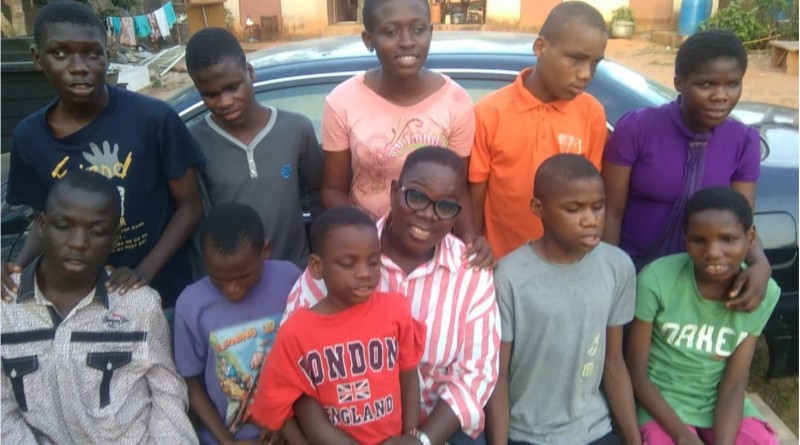
Glory standing directly behind Olagunju
Her life now attracts other frustrated ladies, blind or not, at the Yaba Queen’s College. They confide in her, and seek her counsel. “They said I am good at judging.” It’s either law or mass communication. “I’m good at football analysis. I want to be an OAP.”
Glory doesn’t want to be the richest or anything. “I just want to make impact like Mummy makes here.” She wants to pay back, too. Her mother, Mummy,and Auntie Juliet live on her mind forever.
Most of her colleagues have their dreams, too. Wild ones. Back in Edo then, life, for Christian, had no rhyme or reason. “Every morning, I go my way; you go your way,” he says. When his father brought him, it showed nobody cared. “I had to sit him down, and use a knife to peel off layers of decaying scales cemented on his teeth,” Mummy says. Now he wakes up not to go his way. Morning is for devotion, then housekeeping. “I love to pray.” Though he doesn’t like to be rattled out of bed in the morning, he values hard work now. Because there was an exam for which he felt he prepared hard enough. But he performed below the top three positions he targeted. “There’s no short cut to success in life,” he says. He knows he has to work hard to become a psychologist, and change Nigeria—the bigger picture he sees. “I am not talking of politics when I say I want to change Nigeria. I am talking about helping poor people.” Most of them actually like to play the savior. “There was a day the woman who used to sell us pap told Mummy she and her child had no food to eat,” says Paul. “We too had little rice left. But Mummy went in and gave the woman.”
Ibukun wants to help people when it’s time, but in a divine way: becoming a prophet and computer scientist. “They have told me in different places I am going to be a prophet,” he says. “I see it in my prayer every day that I am a man on a journey.” His coming to the home has further fuelled this passion.
The other Bible-nut Olagunju is grooming in the home is the one Pacelli and other schools ticked off as a no-account. He recalls and raps bible verses he hears with the same accuracy he remembers dates and events. Whatever she saw, Olagunju decided not to give up on Michael after the Oshodi school rejected him. She took him to a school of music. He’s now a drummer in training, chipping in forgotten tidbits during class. He even played the drumset during the school’s last graduation ceremony. “It’s like you have to give yourself a brain this time, Michael.” He recalls giving himself a pep talk the day he enrolled. He hopes to teach music, play instruments, and do everything his music teacher does—except flog students.
Paul, Pamilerin, and others want to become musicians. Destiny believes he’s funny so he’ll end up a comedian.
Road rough and tough still
They know life won’t just hand them all their dreams. Mummy always tells them. The state already gives them the short end of the stick. Lagos has no school for those visually impaired, and it’s not ready to have one. The government believes its inclusive education policy is a cure-all, which is not, according to Lukman Salami, chairman of the Nigeria Association of the Blind, Lagos chapter. He wonders how they come to believe a blind pupil integrated with other children with disabilities can learn at the same rate.
Those in blind children homes will have a chance if grants and support keep coming. Olagunju says the home got some assistance from LASODA recently because of Paul and his sibling.
Other children who didn’t come that way become Olagunju’s own headache. She once sold a gas cooker for N3000 on a particular day the home had no foodstuff, according to Michael. “If government supports the efforts of this woman, blind children won’t be in the street begging,” her neighbor says.
Glory and her mates, if support delays, may be turfed out of the home soon. Their landlord says the estate value of the property—between N25m and N35m—is beyond the home’s finances. “That you are still in the house is because of the value you render,” the quit notice reads in part. The letter forecloses any kind of negotiation. Christian dismisses it. “Some people have ‘skonskon’, and want to make you afraid.” But Michael speaks the mind of Providence. “Eyes have not seen, ears have not heard the place God is taking us to if it’s His will for us to leave his place.” Paul remembers they were not expecting anything a few days ago when ‘CRP’ called the home to come for a bag of rice and other items. “We don’t know them. I am sure God who intervened then will take control. I’m not moved.”
The children have got to a point they no longer fret about the world they can only hear. Wounded as they feel, they don’t carry any chip on their shoulders when they tell their stories that even amuse their Mummy. Having been taught the virtue of compassion, they say they have forgiven the witches that blinded them. Some of the housemates found it tough to do. “I wouldn’t have forgiven her if I had not come here to learn I can still become somebody,” Christian says.
But they have all hammered out a rough opinion about the world outside the home. Ibukun says three out of every five people are hostile to blind people. Glory has learnt to concentrate on the few good ones. She recalls how their caregivers at school tell students with disabilities to not seek any preference when they queue for water.
“‘You don’t have two heads’, they tell us.” But she adores one person: her CRS teacher. It seems education can’t even dissolve the hostility. Christian narrates how some sighted students who visited his school acted like they would contract blindness if they came close to their hosts. Ibukun accidentally bumped into somebody on the road then, and the person hit him back, slap-bang. “He saw that my eyes were open, and he wouldn’t believe it was not intended. My mother said, ‘sorry’.”
Sighted people who don’t act hostile however carry their kindness too far. Which is as bad. The housemates rebuff people giving them alms. They hate pity parties. “I want to study psychology so I can see the mind of those who have that wicked thought that if you can’t see you are a beggar,” Christian says.
With little or no assistance from anybody, Glory moves around, cooks, goes to school, and does other things now. She’s not forcing any miracle either. She just wants to live fully, like a woman. She values love—the type she says her mother shows her father down and out now. Or the type her friends David and Amarachi show as they stick with her still. She must find such love. “I know the kind of mother I have. She won’t let me rest. She wants to carry my baby.” She ducks as a smile and a blush wash over a face.
Ibukun and one other mate will soon graduate to Kings College, too. That’s as far as the home can go, and has always gone, in faithfulness to its vision. Olagunju says the home is for children—not mature men and nubile women.
And Mummy, at this point, has to leave her children to their own devices.
Except Pamilerin.
* WACWDI is abbreviated for Women And Children With Disabilities Initiative
Correction: We regret the earlier mis-attribution of Pacelli PTA chairman.

